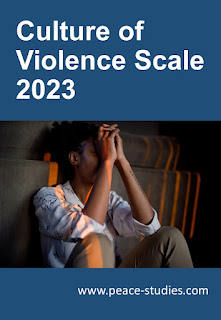The legal Acceptance of Violence in the Countries of the World.
By Franz Jedlicka (you can find the PDF version on Researchgate.net and on Franz Jedlicka's blog), and a Video on our Youtube Channel)
(does not show countries with 1 to 3 points on the Culture of Violence Scale)Items:
Ca –Capital punishment legal (two points)https://en.wikipedia.org/wiki/Capital_punishment_by_country . VAC – (Violence against Children - Corporal punishment of children
legal): http://endcorporalpunishment.org/wp-content/uploads/
legality-tables/Global-progress-table-commitment.pdf .
VACS – Corporal punishment of children in other care settings legal
(same table as VAC)Cj – Judicial corporal punishment legal https://en.wikipedia.org/wiki/Judicial_corporal_punishment#Full_list_
of_countries . TO – Torture (states that have not signed or not ratified the UN Convention
Against Torture) https://en.wikipedia.org/wiki/United_Nations_Convention_
Against_Torture .
MR Marital rape legal https://en.wikipedia.org/wiki/Marital_rape_laws_by_country . VAW no laws addressing domestic violence against women https://genderdata.worldbank.org/indicators/sg-leg-dvaw/ . LGBTIQ+ (Violence against LGBTIQ+ persons legal)
https://en.wikipedia.org/wiki/LGBTQ_rights_by_country_or_territory RANKING 2025 Points Country Items (Ca counts 2 points) 9 Iran Ca Cj LGBTIQ+ MR TO VAC VACS VAW 9 Tanzania Ca Cj TO MR VAC VACS VAW LGBTIQ+ 8 Afghanistan: Ca Cj MR VAC VACS VAW LGBTIQ+ 8 Brunei Darussalam Ca Cj LGBTIQ+ MR TO VAC VACS 8 Yemen Ca Cj VAW MR LGBTIQ+ VAC VACS 7 Cameroon Ca MR VAC VACS VAW LGBTIQ+ 7 Eritrea Ca MR VAC VACS VAW LGBTIQ+ 7 Libya Ca VAW MR VAC VACS LGBTIQ+ 7 Malaysia Ca Cj TO VAC VACS LGBTIQ+ 7 Maldives Ca Cj MR VAC VACS LGBTIQ+ 7 Mauritania Ca Cj VAW LGBTIQ+ VAC VACS 7 Nigeria Ca Cj MR LGBTIQ+ VAC VACS 7 Qatar Ca Cj VAW VAC VACS LGBTIQ+ 7 Saudi Arabia Ca Cj MR LGBTIQ+ VAC VACS 7 Somalia Ca Cj VAW VAC VACS LGBTIQ+ 6 Algeria Ca MR VAC VACS LGBTIQ+ 6 Antigua & Barbuda Ca Cj MR VAC VACS 6 Botswana Ca Cj MR VAC VACS 6 DR Congo Ca MR VAC VACS VAW 6 India Ca MR TO VAC VACS 6 Indonesia Ca Cj MR VAC VACS 6 Iraq Ca VAW MR VAC VACS 6 Jamaica Ca MR VAC VACS LGBTIQ+ 6 Malawi Ca MR VAC VACS LGBTIQ+ 6 Morocco Ca MR VAC VACS LGBTIQ+ 6 Myanmar Ca VAW MR VAC VACS 6 Oman Ca VAW MR VAC VACS 6 Palestine (West Bank & Gaza) Ca MR VAW VAC VACS 6 Sudan Ca VAW VAC VACS LGBTIQ+ 6 Syria Ca VAW MR VAC VACS 6 Uganda Ca MR LGBTIQ+ VAC VACS 6 United Arab Emirates Ca Cj MR VAC VACS 5 Bahamas Ca Cj MR VAC VACS 5 Bahrain Ca MR VAC VACS 5 Bangladesh Ca MR VAC VACS 5 Barbados Ca Cj VAC VACS 5 China Ca MR VAC VACS 5 Dominica Ca Cj VAC VACS 5 Egypt Ca MR VAC VACS 5 Ethiopia Ca MR VAC VACS 5 Gambia Ca VAC VACS LGBTIQ+ 5 Jordan Ca MR VAC VACS 5 Lesotho Ca Cj VAC VACS 5 Mali Ca VAW VAC VACS 5 Niger Ca VAW VAC VACS 5 North Korea Ca MR VAC VACS 5 Pakistan Ca Cj VAC VACS 5 Russia Ca VAW VAC VACS 5 St. Lucia Ca VAC VACS MR 5 Singapore Ca Cj VAC VACS 5 Sri Lanka Ca MR VAC VACS 5 St.Kitts & Nevis Ca Cj VAC VACS 5 Tonga Ca Cj VAC VACS 5 Zimbabwe Ca TO VAC VACS 4 Belarus Ca VAC VACS 4 Belize Ca VAC VACS 4 Burkina Faso Ca VAC VACS 4 Equatorial Guinea MR VAC VACS VAW 4 Grenada Ca VAC VACS 4 Guatemala Ca VAC VACS 4 Guayana Ca VAC VACS 4 Haiti TO MR VAC VAW 4 Kuwait Ca VAC VACS 4 Lebanon Ca VAC VACS 4 Liberia Ca VAC VACS 4 St. Vincent & Grenadines Ca VAC VACS 4 South Sudan Ca VAW MR 4 Taiwan Ca VAC VACS 4 Trinidad & Tobago Ca Cj VAC 4 Tuvalu Cj MR VAC VACS 4 United States Ca VAC VACS 4 Vietnam Ca VAC VACS 3 Bhutan TO VAC VACS 3 Central African Republic MR VAC VACS 3 Chad MR VAC VACS 3 Cuba Ca VACS 3 Djibouti MR VAC VACS 3 Ecuador Cj VAC VACS 3 Eswatini Cj VAC VACS 3 Fiji MR VAC VACS 3 Ghana VAC VACS LGBTIQ+ 3 Madagascar MR VAC VACS 3 Palau TO VAC VACS 3 Papua New Guinea TO VAC VACS 3 Sierra Leone Cj VAC VACS 3 Tajikistan Ca MR 3 Tunisia Ca LGBTIQ+ 3 Western Sahara TO VAC VACS 2 Angola VAC VACS 2 Armenia VAC VACS 2 Australia VAC VACS 2 Azerbaijan VAC VACS 2 Belgium VAC VACS 2 Bosnia & Herzegovina VAC VACS 2 Burundi VAC VACS 2 Cambodia VAC VACS 2 Canada VAC VACS 2 Chile VAC VACS 2 Comoros VAC VACS 2 Cook Islands VAC VACS 2 Cote d’Ivoire VAC VACS 2 Czech Republic VAC VACS 2 Dominican Republic VAC VACS 2 DPR Korea VAC VACS 2 El Salvador VAC VACS 2 Gabon VAC VACS 2 Guinea MR VAW 2 Guinea Bissau VAC VACS 2 Guyana VAC VACS 2 Japan Ca 2 Kazakhstan VAC VACS 2 Kenya Ca 2 Kiribati VAC VACS 2 Kyrgyzstan VAC VACS 2 Laos (PDR Lao) Ca 2 Marshall Island VAC VACS 2 Mexico VAC VACS 2 Micronesia VAC VACS 2 Monaco VAC VACS 2 Mozambique VAC VACS 2 Namibia VAC VACS 2 Nauru VAC VACS 2 Niue VAC VACS 2 Panama VAC VACS 2 Rwanda VAC VACS 2 Samoa VAC VACS 2 Sao Tome & Principe VAC VACS 2 Senegal VAC VACS 2 Serbia VAC VACS 2 Solomon Islands VAC VACS 2 South Korea Ca 2 Suriname VAC VACS 2 Switzerland VAC VACS 2 Thailand Ca 2 Timor Leste VAC VACS 2 Turkey VAC VACS 2 UK VAC VACS 2 Uzbekistan VAC VACS 2 Vanuatu VAC VACS 1 Congo MR 1 Estonia VAW 1 Italy VAC 1 Philippines VAC 1 Slovakia VAC



